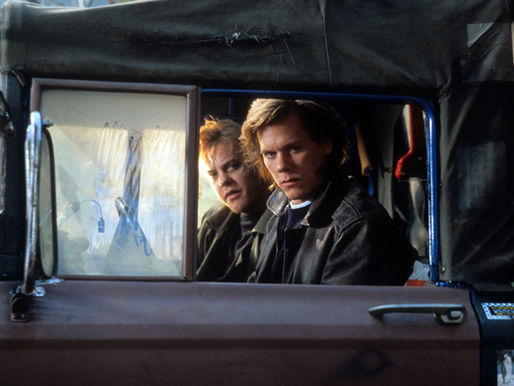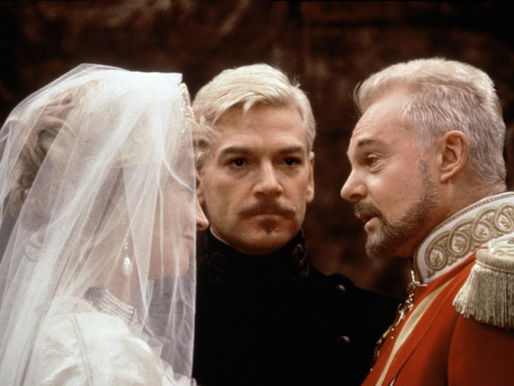top of page
Search
Sci Fi - Fantasy
Classic Science Fiction or Fantasy Films from 1930 - 1999


Scrooged (1988)
Richard Donner’s Scrooged is a sharp, witty, and surprisingly affecting modern spin on Dickens’s evergreen A Christmas Carol, reimagined through the cynical, neon-lit lens of late-1980s American television culture. Anchored by a magnetic and frequently manic performance from Bill Murray, the film mixes satire, slapstick, and sentiment with an energy that, even decades later, remains entirely its own.

Soames Inscker
3 min read


Miracle on 34th Street (1947)
Few Christmas films have achieved the timeless charm, emotional warmth, and enduring cultural status of Miracle on 34th Street. Released in 1947 and directed by George Seaton, the film is a delicate blend of fantasy, comedy, and courtroom drama, anchored by one of cinema’s most memorable portrayals of Father Christmas.

Soames Inscker
3 min read


The Day the Earth Caught Fire (1961)
Released in 1961, The Day the Earth Caught Fire stands as one of the finest examples of British science fiction cinema — intelligent, grounded, and deeply human. Directed and co-written by Val Guest, who had already made his mark with The Quatermass Experiment, the film combines the urgency of Cold War politics with the immediacy of newsroom realism. What results is a gripping, thought-provoking disaster film that feels both of its time and eerily prescient.

Soames Inscker
4 min read


The Quatermass Experiment (1955)
When The Quatermass Experiment was released in 1955, British science fiction was still a relatively unexplored genre in cinema. While America had already embraced flying saucers, atomic monsters, and Cold War paranoia, the United Kingdom’s screen science fiction had been more restrained and intellectual.

Soames Inscker
4 min read


Capricorn One (1977)
When Capricorn One was released in 1977, audiences were still living in the shadow of the Watergate scandal and the Vietnam War—two events that had eroded public trust in government and media institutions. Against this backdrop, Peter Hyams’ taut conspiracy thriller struck a deep cultural nerve. Blending elements of science fiction, political drama, and survival adventure, Capricorn One is both an intelligent entertainment and a reflection of a paranoid age. It stands as one

Soames Inscker
5 min read


Camelot (1967)
Joshua Logan’s Camelot (1967) stands as one of the most lavish and ambitious film musicals of its era — a sweeping adaptation of the celebrated Lerner and Loewe stage show that sought to bring the Arthurian legend to life through song, spectacle, and romance.

Soames Inscker
5 min read


Star Wars: Episode I – The Phantom Menace (1999)
When George Lucas returned to the galaxy far, far away in 1999 with Star Wars: Episode I – The Phantom Menace, it marked one of the most anticipated cinematic events in history. Sixteen years had passed since Return of the Jedi (1983), and the weight of expectation was immense. Fans hoped to see the origins of the saga’s mythic conflict, the rise of Darth Vader, and the early days of the Jedi Order.

Soames Inscker
6 min read


Galaxy Quest (1999)
Directed by Dean Parisot and written by David Howard and Robert Gordon, Galaxy Quest is a gleefully inventive and affectionate satire of science fiction fandom and television culture. Released in 1999, the film functions both as a loving parody of Star Trek and a heartfelt ode to the fans who keep such cult universes alive. It’s a film that deftly balances comedy, adventure, and genuine emotion — a rare achievement in a genre that so easily tips into either mockery or self-in

Soames Inscker
5 min read


Jumanji (1995)
Joe Johnston’s Jumanji is one of the most distinctive family adventure films of the 1990s – a film that blended practical effects, groundbreaking CGI, and a surprisingly dark emotional core to deliver a story that was as much about courage, redemption, and second chances as it was about stampeding elephants and giant spiders.

Soames Inscker
4 min read


Invasion of the Body Snatchers (1956)
Don Siegel’s Invasion of the Body Snatchers (1956) is a landmark in American science fiction and horror, a chilling allegory of conformity, paranoia, and the fragility of individuality. Released during the height of the Cold War, the film has often been interpreted as a metaphor for the Red Scare, McCarthyism, or the fear of ideological subversion. Yet its power endures because of its taut storytelling, claustrophobic atmosphere, and relentless tension.

Soames Inscker
4 min read


Batman Forever (1995)
Batman Forever, directed by Joel Schumacher and released in 1995, marked a dramatic tonal shift in the Batman film franchise. Following the darker, gothic stylings of Tim Burton’s “Batman” (1989) and “Batman Returns” (1992), Schumacher’s installment introduced a more vibrant, comic-book-inspired aesthetic.

Soames Inscker
4 min read


Flatliners (1990)
oel Schumacher’s Flatliners is a visually striking and psychologically charged thriller that blends science fiction, horror, and morality play into a unique cinematic experience. Released in 1990, the film stars Kiefer Sutherland, Julia Roberts, Kevin Bacon, William Baldwin, and Oliver Platt as a group of ambitious medical students who dare to flirt with death itself.

Soames Inscker
4 min read


Being John Malkovich (1999)
Spike Jonze’s Being John Malkovich, released in 1999, is one of the most original, inventive, and surreal films to emerge from American cinema in the 1990s. A bizarre blend of absurdist comedy, philosophical science fiction, and psychological drama, the film marked the feature debut of both Jonze (director) and screenwriter Charlie Kaufman.

Soames Inscker
4 min read


Interview with the Vampire (1994)
Neil Jordan’s Interview with the Vampire is a lush, brooding, and provocative gothic horror film that revitalized the vampire mythos for a new generation. Adapted from Anne Rice’s bestselling 1976 novel, the film offers a moody and philosophical exploration of immortality, moral decay, and loneliness, all wrapped in lavish 18th- and 19th-century decadence. Stylish and atmospheric, it remains one of the most distinctive vampire films ever made.

Soames Inscker
3 min read


The Iron Giant (1999)
The Iron Giant, directed by Brad Bird in his feature film debut, is one of the most emotionally resonant and artistically accomplished animated films of the 1990s. Released in 1999 by Warner Bros., the film is a stirring blend of science fiction, Cold War-era paranoia, and heartfelt storytelling. Though it initially struggled at the box office, The Iron Giant has since earned its rightful place as a modern animated classic, beloved for its sincerity, artistry, and powerful me

Soames Inscker
3 min read


Groundhog Day (1993)
Groundhog Day, directed by Harold Ramis and released in 1993, is more than just a quirky time-loop comedy—it’s a deeply philosophical and emotionally resonant film that has only grown in stature and relevance over the years. Blending romantic comedy, metaphysical inquiry, and character study, the film is a triumph of smart writing, impeccable direction, and one of Bill Murray’s finest performances.

Soames Inscker
3 min read


Hamlet (1996)
Kenneth Branagh’s Hamlet (1996) is a landmark in Shakespearean cinema. A four-hour epic that adapts the full, unabridged text of William Shakespeare’s most famous tragedy, this version is as ambitious as it is sumptuous.

Soames Inscker
4 min read


Toy Story 2 (1999)
Toy Story 2 is a rare sequel that not only lives up to the original—it arguably surpasses it. Released in 1999, four years after Pixar's groundbreaking Toy Story, this follow-up expands the universe with emotional depth, character development, and dazzling animation that reflects the studio's rapidly evolving capabilities. Directed once again by John Lasseter, the film proves that animated storytelling can be as poignant, witty, and sophisticated as any live-action film.

Soames Inscker
3 min read


The Green Mile (1999)
Frank Darabont’s The Green Mile (1999) is a sprawling, deeply affecting film that fuses prison drama, supernatural mystery, and a meditation on morality and mortality. Based on Stephen King’s serialized novel of the same name, the film reunites Darabont with the themes of guilt, redemption, and human dignity that he so memorably explored in The Shawshank Redemption (1994).

Soames Inscker
4 min read


Gattaca (1997)
Gattaca, released in 1997, is a cerebral, stylish, and hauntingly prescient science fiction film that explores themes of genetic determinism, individuality, identity, and human potential. Written and directed by Andrew Niccol in his feature film debut, the film offers a compelling critique of a possible future dominated by eugenics, bioengineering, and an obsession with genetic "perfection."

Soames Inscker
4 min read
bottom of page


